a word about alterations.
(mostly) due to the popularity of the designer jean, modern shoppers know that, when purchasing denim, the hem will most likely be too long. this is true in our store, where nearly nine out of ten jeans sold go out to the seamstress before they hit a customer's closet. however, for one reason or another, the idea of tweaking does not translate to other categories.
in the same way that jeans that are made in a standard length, clothing also has a standard. in higher end clothing, one sample is made from one fit model (who can change from season to season, year to year) and all other sizes are scaled based off of this. and, as we know, every body type has innumerable variations that cannot be accounted for by a designer/label. as such, many people have grown accustomed to either compromising on fit or foregoing a piece that feels just a little off. from a retailer's point of view (and certainly a designer), this can be a scary premise. if the fit model of a line has, for example, a slightly longer distance between shoulder and ribs than most people or a rear that is proportioned a little differently, the clothes for the entire season will reflect this. it's important for people to keep this in mind while shopping.
in effect, alterations bridge the gap between generic and personal, and cushions a given design and manufacturing quirk. and it's oftentimes the smallest changes that make the biggest difference. taking straps up 1/4 of an inch can transform a dress. hemming a sleeve 1/2 an inch or taking in armholes can take a garment from mediocre to magical.
on a large scale, i aliken it to purchasing a house. on the very rare occasion, someone will find the "perfect" house (i'm not a cynic, but i think there are probably similarities in personality of people who claim this), but most of the time, if someone buys a house, changes are made. sometimes these translate to taking out walls and sometimes it's just painting. it's not about it being wrong or right, it's preference. ultimately, the derivative reason for personalizing one's residence is that it changes a house into a home. it makes it more individual and less automated, and it enhances the sense of ownership.
the analogy breaks down, i realize. mostly because clothing is generally not near the investment of a home. but clothing is an investment, nonetheless, and worth the effort to make it right. the "buy now, wear now" culture is fleeting. it cannot last, lest the fabric of our culture disintegrate. the more time or money or effort you spend toward a given thing, the more likely it is that you will grow attachment to it (value it). when you have a piece of clothing that engages you visually and it fits great, the more likely you will think of it when you're getting dressed and the more likely it will be that you will return to it time and time again. in the end, it's getting the most return on your investment.
in our shop, we try to encourage people to find what speaks to them, as that is most important and the one thing that cannot be tweaked or replicated. if the fit is not perfect but close, we encourage customers to let us work with it. some customers alter nearly everything they buy, not necessarily because they have extreme body types, but because "almost right" is never and will never be "just right". some people tweak and some choose to overhaul a garment, everyone seems to have a different threshold. however, the positive feedback rate is 100%, not because we always get it right, but when it's not, we work with people until it is. after all, taking something that has two dimensions and asking for it to work with something (a body, in this case) that has three dimensions can be tricky!
in a time and culture where every part of life is customizable and options flow like milk and honey in the promised land, it's surprising to me that more people don't embrace this.
yes, you will have to wait a few more days, yes, it will cost you a little bit of money (although most alterations here are very modest in comparison to the garment), but it will be better than new because it's perfect for you and just you. in effect, you own your look and not the other way around (does the moniker, "fashion victim", ring a bell?). what a difference a hem makes.
01 August 2009
Subscribe to:
Post Comments (Atom)

No comments:
Post a Comment